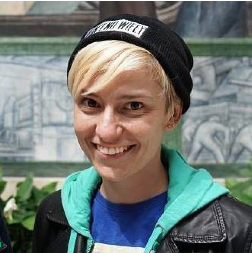P.C.- Understanding Political Correctness with Chloe Root

Chloe Root teaches U.S. history, economics, and mock trial here at Community, and attended CHS as a student.
Originally Published May 12, 2016:
P.C. usually stands for “politically correct,” a phrase that’s been thrown around a lot lately in political debates. However, when Chloe Root attended Community High, she was introduced to another meaning for P.C.: public courtesy. She was taking a CR with a long-time English professor at University of Michigan, Ralph Williams. She liked this phrase better than the original, because it better captures how she would like people to communicate: by just speaking respectfully.
“What I take issue with, with political correctness, is it’s talking about it as if there’s one way,” Root said. “And I think that’s where the public courtesy idea is better, because you can think about it in a way that everyone is going to be respected and mutually intelligible, instead of just being like the ‘correct way.’ Because that’s going to depend so much on where you are and who you’re talking to.”
Merriam-Webster defines political correctness as “conforming to a belief that language and practices which could offend political sensibilities (as in matters of sex or race) should be eliminated.” Some liberals have embraced the term by defending the idea behind it: non-offensive language, especially in reference to groups who are discriminated against. Meanwhile, in this year’s Republican presidential candidate debates, it has become a negative buzzword, used often and to much applause. As Donald Trump put it, “I am so tired of this politically correct crap.”
To properly understand how this phrase came into use, it’s good to look at its history. ‘Politically correct’ was first used in the 1930s to mean the correct position for a Communist Party member. The term was later used in the New York Times, in reference to how Nazi Germany and the Soviet Union constrained speech and freedom of the press. These examples do not put being politically correct in a favorable light. However, President Lyndon B. Johnson used it to mean what would gain him political points. In 1964, he said, “I’m here to tell you that we are going to do those things which need to be done, not because they are politically correct, but because they are right.” The phrase with its current meaning really took off in the early ‘90s, and has been used more and more cynically over time. An October 2015 poll by Fairleigh Dickinson University showed, 68 percent of participants thought “a big problem this country has is being politically correct.”
“I don’t think that actually expecting people to use respectful language is at all problematic. I think that’s a basic expectation,” Root said. Examples of respectful language that are easy to use include using preferred pronouns, wishing people holiday greetings for whatever they celebrate, and refraining from using slurs targeted at racial groups, women, LGBTQ and other groups that face discrimination.
The common argument against political correctness is that asking people not to use disrespectful, offensive language limits the idea of freedom of expression. “The notion of political correctness has ignited controversy across the land,” said President George H. W. Bush, in a speech to University of Michigan graduates in 1991. “And although the movement arises from the laudable desire to sweep away the debris of racism and sexism and hatred, it replaces old prejudice with new ones. It declares certain topics off-limits, certain expressions off-limits, even certain gestures off-limits.”
As a counterargument to this, the people protesting political correctness are themselves limiting conversation. People who are offended by things other people say are told they are just being too sensitive. The problem with the phrase “politically correct” is when people use it not only to say what they like, but also to prevent anyone from disagreeing, completely going against their own mantra of “free speech.”
“I don’t love the term politically correct, because I think that’s been sort of deployed to make people feel like they’re being too sensitive about issues of language, and I think language is really important,” Root said. “I think everybody should be more patient with each other as far as language and politics goes, because I think we have a really polarized climate right now that’s really bad for dialogue.”
Political correctness in no way takes away from our legal right to free speech. You just might anger someone if you say something offensive. “I think with any opinion you have the right to your opinion but also, you have to listen to others people’s responses,” Root said. “It’s just that people think that free speech means they don’t have to suffer any of the consequences of anything that they say.”
In a perfect world, all opinions would be heard out and politely taken into consideration. This is not the case, but we can all help bring it closer to reality.
“I just think that when you’re educating people about it, you should also be really respectful, and be humble about it, because some people act like they know everything, and nobody knows everything,” Root said. “You know, like everybody learns terms or words that they have used before that they didn’t realize were problematic, or there are words that we’re probably using generally in the population that someday we’ll figure out there’s a better word to use, you know, and I don’t think that’s a problem. I think it’s good that language changes that way.”



